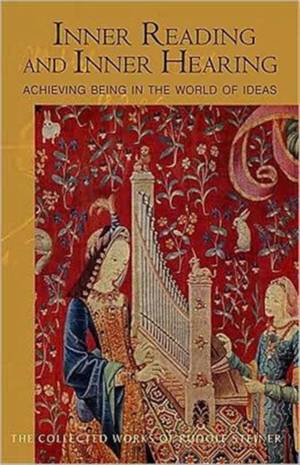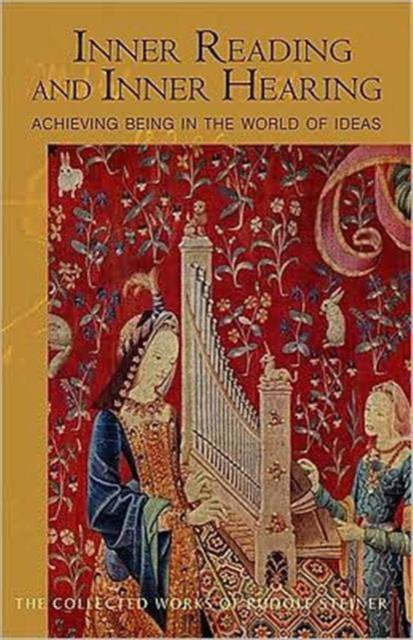
- Afhalen na 1 uur in een winkel met voorraad
- Gratis thuislevering in België vanaf € 30
- Ruim aanbod met 7 miljoen producten
- Afhalen na 1 uur in een winkel met voorraad
- Gratis thuislevering in België vanaf € 30
- Ruim aanbod met 7 miljoen producten
Inner Reading and Inner Hearing
And How to Achieve Existence in the World of Ideas (Cw 156) Volume 156
Rudolf SteinerOmschrijving
2 lecture courses & 2 Christmas lectures, Dornach, Oct. 3-7 & Dec. 12-20, 1914; Dornach, Dec. 26 and Basel, Dec. 27, 1914 (CW 156)
" 'Inner Reading and Inner Hearing, ' the first cycle, was originally intended to contain fourteen lectures. They were to be given during the rehearsal of Steiner's new Mystery Drama, which would have carried the previous four plays to a new level. This fifth play was to have been written during rehearsals in Munich, but the War made rehearsals impossible. It was never written. Nevertheless, in response to requests that he give the lectures anyway, Steiner gave what he had previously conceived of as a major and extended cycle of fourteen lectures in the shortened form of four lectures. Though, as he says, the war now made it impossible to say what he would have said in Munich--'It is just not possible to speak the highest truths into the storm'--what he did say, perhaps precisely because he was forced to speak at a 'lower' level, is unusually clear, astonishing, and enormously instructive." -- Christopher Bamford (introduction)These two lecture courses, given just after the beginning of World War I, stand as a kind of unexpected gift. A few months later, once the war became a reality, the possibilities for esoteric work would change and it would become more difficult to do spiritual research. But in the short interval before the true horror of the conflict unfolded, Rudolf Steiner--almost by the way--was able to give these lectures, which lay out in the clearest fashion the path of anthroposophic meditation, and its assumptions, language, and consequences.
The first lectures expand on the idea of inner "reading" and "hearing" as the path to spiritual knowing. The spiritual world gives something and we, as spiritual researchers, receive and then read or interpret it. Spiritual knowledge is not a matter of will, desire, or intention on our part, but a gift from the spiritual world for which we must prepare ourselves by silencing our desires, emptying ourselves, and presenting ourselves in humility and devotion to the spiritual world. Then we become aware of the reality that the spiritual world is nowhere else but here, all around us; and if we dissolve the sense of being skin-bound, we can become open to it, reflect its images in our astral bodies, and then learn to read them by identification. Steiner describes this complex, subtle, existential and living process, in which ultimately we can become one with the universe, in a masterful way from which anyone who meditates, or wishes to begin to meditate, will gain a great deal.
"Where are the beings of the elemental world; where are the beings of the spiritual world; where are the beings of the higher hierarchies? They are right where we are. They are all around us--where the table and the chairs are, where you yourselves are. They are everywhere all around us, but they are so thin and evanescent compared to the relationships and processes of the things of the external world that they escape our attention. We continually go straight through the spiritual world and do not see it; we are inattentive to the spiritual world because our constitution is not prepared for it." -- Rudolf Steiner (Oct. 3, 1914)The second lecture cycle, "How to Achieve Existence in the World of Ideas," deepens the themes developed in the first cycle, so that the two together provide a useful guide to the processes underlying meditation or learning to know the spiritual world. At the same time, because work was just beginning on the building that would become the Goetheanum, Steiner connects the esoteric principles of its design with the overall theme of the suprasensory human being in relation to meditation and spiritual knowing.
The volume closes with two wonderful lectures in celebration of Christmas. Here Steiner has a threefold emphasis: Christ, supraearthly, glorious, and divine, fully united with humanity and the Earth and born in each human heart. To celebrate Christmas truly means that we recognize all three of these as one in the spiritual world, in the earthly world, and in ourselves.
This volume is a translation from German of Okkultes Lesen und okkultes Hören (GA 156).
Specificaties
Betrokkenen
- Auteur(s):
- Vertaler(s):
- Uitgeverij:
Inhoud
- Aantal bladzijden:
- 248
- Taal:
- Engels
- Reeks:
- Reeksnummer:
- nr. 156
Eigenschappen
- Productcode (EAN):
- 9780880106191
- Verschijningsdatum:
- 20/11/2008
- Uitvoering:
- Paperback
- Formaat:
- Trade paperback (VS)
- Afmetingen:
- 150 mm x 231 mm
- Gewicht:
- 385 g

Alleen bij Standaard Boekhandel
Beoordelingen
We publiceren alleen reviews die voldoen aan de voorwaarden voor reviews. Bekijk onze voorwaarden voor reviews.









